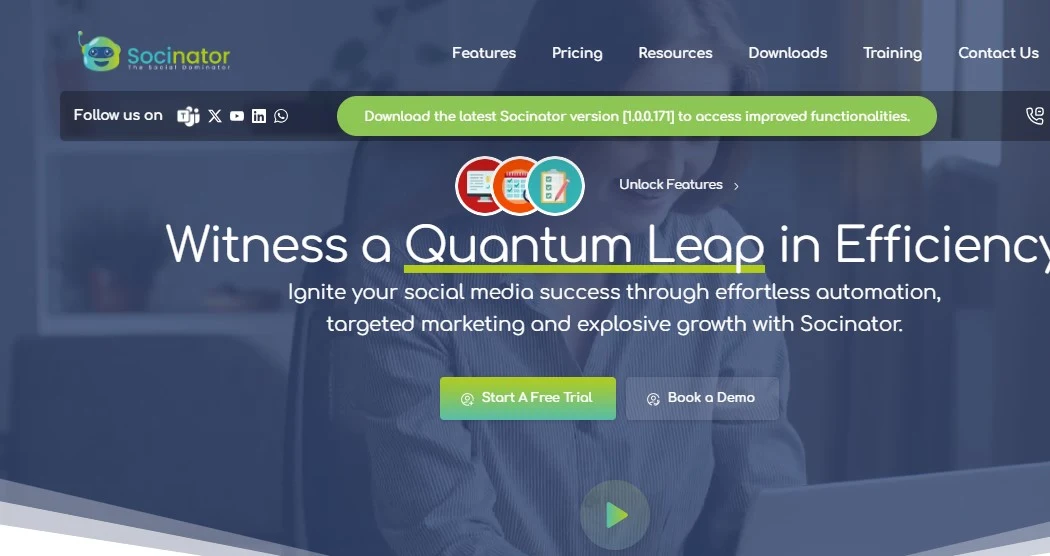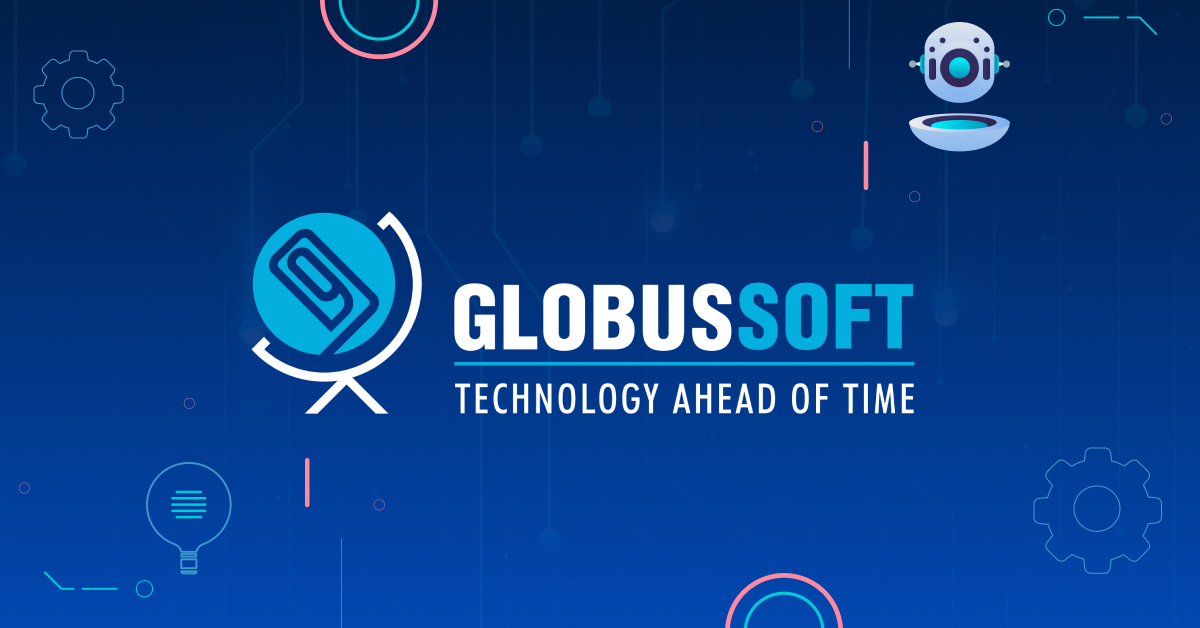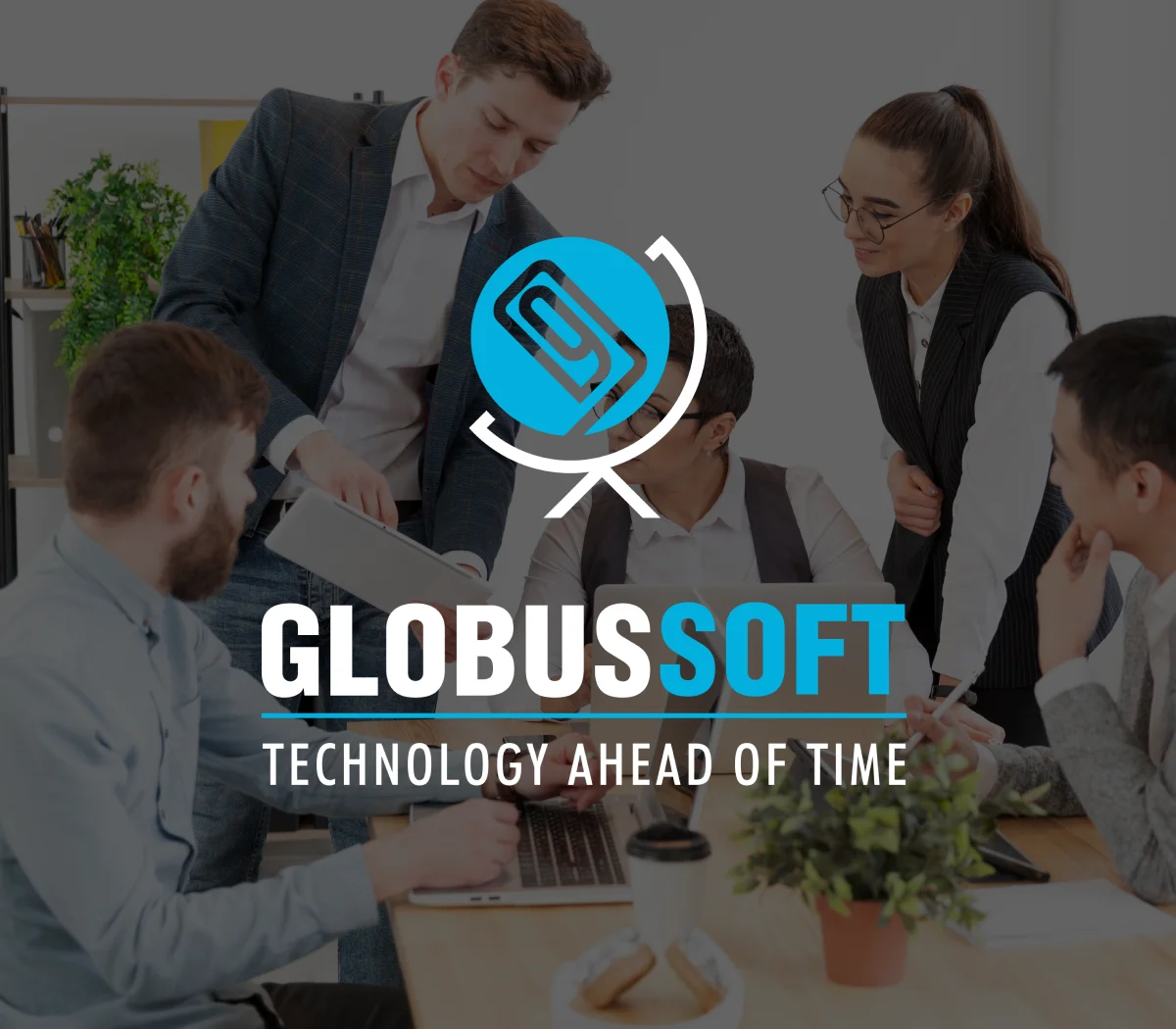
Every brand looks for ways to connect with audiences faster and more effectively. Social media continues to evolve, and traditional methods no longer guarantee the same results. Businesses need tools that offer speed, accuracy, and personalization. That is where AI in social media comes into play. With the right approach, companies can unlock stronger engagement, smarter targeting, and measurable growth.
This blog breaks down the role of AI in building social engagement, how businesses benefit from it, and how platforms like Globussoft and Socinator help automate processes for better results.
Listen To The Podcast Now!
What Does AI On Social Media Mean?
When people hear about AI on social media, many think about chatbots or automatic replies. In reality, the scope is far wider. AI stands for systems that analyze data, learn patterns, and make smart decisions. On platforms like Facebook, Instagram, and LinkedIn, AI powers recommendation engines, ad targeting, and content personalization.
For marketers, AI means more than just automation. It gives deeper insight into what audiences want, when they want it, and how they interact with content. By applying AI in social media, brands can predict behavior, boost visibility, and ensure consistent engagement without wasting resources.
The Connection Between Social Media And AI In Modern Marketing
 The relationship between social media and AI has become inseparable. Every major platform uses artificial intelligence to refine the user experience, from detecting fake accounts to recommending personalized content. Businesses now leverage the same intelligence to engage audiences with precision and scale. Let’s break down how AI on social media strengthens modern marketing strategies.
The relationship between social media and AI has become inseparable. Every major platform uses artificial intelligence to refine the user experience, from detecting fake accounts to recommending personalized content. Businesses now leverage the same intelligence to engage audiences with precision and scale. Let’s break down how AI on social media strengthens modern marketing strategies.
1. Identify Audience Interests Faster
One of the most powerful advantages of AI in social media lies in its ability to analyze massive amounts of data quickly. Traditional methods of understanding audience preferences involved surveys, feedback forms, or manual monitoring of posts. Today, AI tools track interactions such as likes, shares, comments, and even the time users spend on specific types of content.
For example, if a brand posts a series of short videos and one format consistently performs better, AI algorithms detect this pattern immediately. Marketers no longer wait weeks to understand trends; they receive real-time insights that guide their next steps. This helps businesses identify what resonates with their audience faster, making campaigns more timely and impactful.
2. Personalize Campaigns at Scale
Every customer wants to feel that a brand speaks directly to them. AI makes this possible by segmenting audiences based on demographics, behavior, and interests. Instead of sending the same generic message to thousands of followers, AI creates multiple variations tailored to each group.
For instance, an e-commerce brand can show different ads for fitness gear, casual wear, or formal clothing depending on the browsing history of each user. On a larger scale, AI ensures that millions of people see content that feels personalized, something impossible to achieve manually. This level of personalization boosts engagement, improves click-through rates, and drives stronger conversions.
3. Track Customer Emotions Through Sentiment Analysis
Marketing is not just about numbers; it’s about understanding emotions. AI on social media uses sentiment analysis to gauge how audiences feel about a brand, product, or campaign. By scanning comments, reviews, and mentions, AI detects whether the tone is positive, negative, or neutral.
For example, if a new product launch receives excitement and positive feedback, sentiment analysis confirms its success. On the other hand, if complaints dominate the conversation, businesses can respond quickly to manage the situation. This real-time tracking of emotions helps companies maintain a healthy brand reputation and adjust strategies before issues escalate.
Reshaping Marketing With AI on Social Media
When combined, these capabilities transform how businesses approach marketing. Campaigns no longer rely on assumptions or outdated data. Instead, they become driven by live insights, audience preferences, and emotional analysis. The result is smarter, faster, and more measurable outcomes.
By integrating social media and AI, brands can connect more authentically, personalize at scale, and strengthen their overall marketing performance.
The Importance Of A Social Analytics Tool In Engagement Growth
Data drives performance. Without insights, marketers cannot measure whether strategies work. A social analytics tool turns raw numbers into clear performance metrics, helping brands act with confidence instead of guesswork.
Using AI-driven analytics, brands can:
1. Measure Engagement Rates On Each Platform
Engagement metrics such as likes, comments, shares, and click-through rates reveal how audiences interact with content. A social analytics tool collects this data across platforms, giving marketers a unified view of performance. With AI support, businesses can spot trends instantly and adjust campaigns to maximize audience attention.
2. Discover Top-Performing Content Formats
Not all content performs equally; some posts spark high interaction, while others get ignored. AI-powered analytics identifies whether videos, carousels, or short posts drive better engagement. By highlighting winning formats, brands can focus more resources on the type of content that delivers the strongest results.
3. Compare Audience Responses Across Demographics
Different age groups, locations, and interests respond differently to campaigns. A social analytics tool breaks down these variations, showing what resonates with each demographic. This insight helps marketers create tailored strategies, ensuring every segment feels valued and connected to the brand.
Why This Matters
A social analytics tool not only highlights what works but also points out content that fails to connect. This prevents wasted effort on campaigns with little impact. By combining AI in social media with analytics, businesses ensure that every post, ad, and strategy contributes to stronger engagement growth.
Read More!
How To Do Social Media Competitive Analysis Effectively?
How Can Social Media Automation Boost Your Content Strategy?
Benefits Of Using AI On Social Media For Businesses?
Businesses that adopt AI on social media enjoy several advantages:
- Personalization at Scale
AI allows brands to deliver customized messages to different audience segments automatically. Instead of sending generic posts, businesses can adapt tone, visuals, and offers to match user preferences. This makes interactions more relevant and drives stronger engagement.
- Better Targeting
AI analyzes user behavior, demographics, and interests to identify the most responsive audience. This ensures that ads and content appear only to people who are likely to take action. As a result, businesses save resources while improving conversion rates.
- Faster Customer Support
AI-powered chatbots handle inquiries instantly, from basic FAQs to order tracking. This reduces wait times and keeps customers satisfied, even outside business hours. Companies benefit from improved service without increasing support staff.
- Predictive Insights
By examining past performance and real-time data, AI predicts which topics, formats, or trends will perform best. Businesses can use these insights to plan content that aligns with future demand. This reduces guesswork and ensures campaigns stay relevant.
- Cost Efficiency
AI helps optimize ad spending by automatically adjusting bids, placements, and targeting. Instead of wasting money on low-performing campaigns, businesses invest where results are proven. This makes marketing budgets stretch further and deliver higher ROI.
The biggest benefit is that AI in social media reduces trial and error. Campaigns rely on real data, giving businesses a clear path to success.
AI On Social Media: Practical Use Cases You Should Know
AI has already changed how brands approach social networks. Some of the most common applications include:
AI Chatbots
AI-powered chatbots provide round-the-clock customer support, answering common queries instantly. They reduce the need for human intervention while maintaining consistency in communication. This improves customer satisfaction and helps businesses save time and resources.
Smart Advertising
AI analyzes user behavior and preferences to design highly targeted ads. These ads are more likely to reach the right people and convert into sales compared to generic campaigns. As a result, businesses achieve better ROI from their marketing budgets.
Visual Recognition
AI tools can scan images and videos to detect logos, products, or brand mentions shared by users. This helps businesses track organic exposure and identify user-generated content. It also allows brands to quickly respond to posts featuring their products.
Sentiment Analysis
By studying comments, reviews, and conversations, AI determines whether people feel positive, negative, or neutral about a brand. This insight allows companies to adjust messaging or resolve issues quickly. It also helps measure the real impact of campaigns.
Automated Reporting
AI eliminates the manual effort of analyzing campaign data by generating real-time performance reports. These reports highlight key metrics, trends, and areas for improvement. This speeds up decision-making and keeps strategies aligned with goals.
Conclusion of Use Cases
These applications show that AI in social media is no longer optional—it is a powerful necessity for modern businesses. Brands that embrace it gain speed, accuracy, and competitive advantage in engaging their audiences.
Each of these use cases proves that AI in social media is not a future idea—it is a present necessity.
How Globussoft Brings AI Automation To Social Media Marketing
Globussoft has established itself as a pioneer in creating intelligent software solutions that simplify complex business challenges. In the space of AI in social media, the company plays a vital role by offering automation tools that save time, reduce manual effort, and maximize engagement. Its focus on combining innovation with data-driven intelligence makes it a trusted partner for brands that want to strengthen their social presence.
Through AI-powered automation, Globussoft helps companies:
- Automate repetitive posting tasks so teams can focus on creativity and strategy.
- Gain actionable insights through advanced analytics that reveal what content resonates.
- Maintain consistent engagement across platforms without missing peak activity times.
By blending social media and AI, Globussoft ensures businesses no longer struggle with time-consuming manual processes. Instead, they enjoy streamlined workflows and smarter targeting that boost marketing results.
One of the most powerful solutions from Globussoft that embodies these values is Socinator, a comprehensive automation and analytics platform built for marketers who want to manage everything from one place.
How Socinator Helps In Social Media Automation
Managing multiple social media accounts can quickly become overwhelming. Socinator simplifies the process by combining automation, scheduling, and analytics into one platform. It allows businesses to stay consistent, reach the right audience, and save valuable time without switching between different tools.
Why Choose Socinator?
Socinator isn’t just another scheduling tool; it’s a complete automation companion. It offers:
- Access to 9+ social platforms from one unified dashboard.
- Hassle-free scheduling to maintain consistency without manual posting.
- Detailed analytics to track engagement, clicks, and overall performance.
- Content calendar planning for a steady, well-structured online presence.
- Audience targeting to reach the right people at the right time.
- Built-in account security to keep your social presence safe.
Core Features of Socinator
Socinator empowers brands with everything they need to grow their presence while saving time:
- Social Media Scheduling: Plan and publish posts at peak times automatically.
- Content Management: Organize campaigns, creatives, and marketing assets without clutter.
- Automation Tools: Perform repetitive tasks like auto-publish, auto-like, auto-comment, and auto-message, letting businesses focus on strategy.
- Analytics and Insights: Get clear, actionable reports to fine-tune campaigns.
- Audience Targeting: Ensure that posts are always seen by the most relevant audience.
Platform-Specific Benefits
Socinator is tailored to each major platform, ensuring automation works in the most impactful way:
- Instagram: Auto-publish posts, auto-likes, messaging, and even data scraping.
- Facebook: Automatic publishing, liking, and commenting to keep engagement high.
- Twitter (X): Automated tweets, retweets, and real-time engagement.
- YouTube: Manage channels, schedule content, auto-subscribe, and streamline video promotions.
- LinkedIn: Publish posts, send automated connection requests, and maintain professional engagement.
- Pinterest, Reddit, Quora, Tumblr: Smart automation features designed to increase visibility and community interaction.
Why Businesses Love Socinator
Unlike many tools that focus on just one aspect of social media management, Socinator integrates automation and analytics. It not only helps brands stay active but also gives them the data to make informed decisions. With easy tutorials, quick demos, and responsive support, even first-time users can maximize results without a steep learning curve.
For any business serious about growth, Socinator is more than a tool it’s a complete social media automation partner.
The Future Of Social Media And AI: What’s Coming Next?
The role of AI in social media will continue to expand. Some trends to expect include:
- Hyper-personalization
AI will refine personalization beyond basic demographics, creating content and ads that match individual tastes and habits. Every user could see a different version of the same campaign, making engagement stronger. This ensures that interactions feel more authentic and relevant.
- Predictive Marketing
Instead of reacting to customer behavior, AI will anticipate it. By analyzing past actions and trends, AI will design campaigns aimed at what users are most likely to do next. This shift will reduce wasted ad spend and improve conversion rates.
- AI-driven Influencer Selection
Brands will no longer rely solely on manual research to find influencers. AI will scan audience data, engagement quality, and authenticity to recommend the most suitable partners. This ensures collaborations are more effective and trustworthy.
- Advanced Audience Sentiment Tracking
Future AI tools will go beyond identifying positive or negative comments. They will detect nuanced emotions like excitement, frustration, or curiosity, giving brands deeper insights. With this, companies can fine-tune strategies to match audience feelings in real time.
Businesses that adapt early will secure a stronger foothold in competitive markets.
Best Practices For Using AI In Social Media Without Losing Authenticity
AI on social media offers unmatched efficiency, but relying too heavily on it can risk making a brand feel robotic or disconnected. To strike the right balance, businesses should follow these practices:
- Keep Human Creativity at the Core
AI can generate content, but a true emotional connection comes from human creativity. Use AI to assist in data analysis and automation while letting your team craft the brand’s unique voice and storytelling. - Use AI as a Guide, Not a Replacement
Let AI provide insights, schedule posts, or recommend strategies, but keep decision-making in human hands. This ensures your campaigns stay aligned with brand values and avoid generic messaging. - Personalize Customer Interactions
While AI chatbots are efficient, they should not sound mechanical. Train them to use friendly language and, when necessary, escalate to human agents for complex issues. This balance keeps customer service authentic and trustworthy. - Monitor AI-Generated Content Regularly
AI-generated suggestions, captions, or reports should be reviewed for accuracy and brand consistency. Without human oversight, mistakes or tone mismatches can damage credibility.
By combining authenticity with smart automation, businesses can ensure AI on social media strengthens trust instead of weakening it.
Conclusion
AI has redefined how companies use social platforms. From chatbots to advanced targeting, every feature improves engagement. A strong social analytics tool paired with automation ensures consistent results.
Businesses that adopt AI in social media today will dominate tomorrow. With platforms like Globussoft for automation and Socinator for comprehensive management, companies get the perfect mix of intelligence and efficiency. The future belongs to those who blend creativity with AI-driven strategy.
FAQs
- What is AI in social media?
AI in social media refers to systems that analyze data, learn patterns, and make intelligent decisions. It powers content recommendations, ad targeting, and engagement insights to help brands connect with their audience effectively. - How can AI boost engagement on social media?
AI boosts engagement by personalizing content, predicting audience preferences, and analyzing interactions in real-time. It ensures that posts, ads, and messages resonate with the right audience, increasing likes, shares, and comments. - What is a social analytics tool, and why is it important?
A social analytics tool collects and interprets data from social media platforms. It helps marketers track engagement, identify top-performing content, and make data-driven decisions to improve campaigns efficiently. - Can AI replace human creativity in social media marketing?
No, AI is a tool to assist creativity, not replace it. Human creativity ensures brand voice, emotional storytelling, and authenticity, while AI handles data analysis, automation, and optimization.






